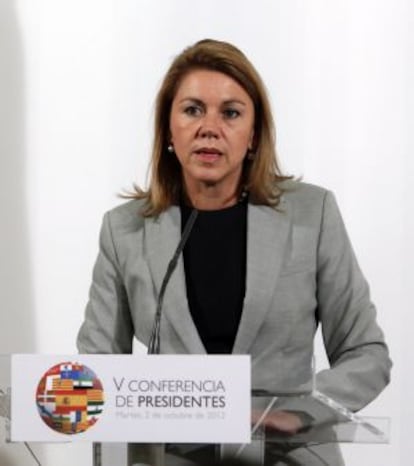Opposition parties up in arms over La Mancha leader’s pay cuts
Elimination of salary will enable lawmakers to make money elsewhere, says premier De Cospedal

Defending her decision to cut regional lawmakers' salaries next year, Castilla-La Mancha premier María Dolores de Cospedal said on Thursday that the work parliamentarians do at a local level "is not as intense" as it is at the congressional level.
Speaking on RNE state radio, De Cospedal explained that her decision to eliminate regional deputies' salaries and replace them with per diems is not so much a budget-cutting measure, but rather an incentive "for those who want to go into politics and embark on a profession in the private sector at the same time."
"This didn't sit well with those in the Socialist Party, residents and others," she said. "The local parliamentarians have an important legislative function but it isn't as intense as that of their counterparts at the national level."
Members of Castilla-La Mancha's regional parliament working as full-time lawmakers currently earn between 2,800 and 3,000 euros a month. De Cospedal, who also serves as Popular Party (PP) secretary general and a member of Congress, which entitles her to three salaries, has proposed giving the 49 members of the Castilla-La Mancha legislative body 1,000 euros a month in per diems.
José Antonio Griñán, the Socialist regional premier in Andalusia, warned that allowing local lawmakers to earn cash from outside activities was tantamount to "mortgaging their independence as parliamentarians."
"Political advantage"
Meanwhile, in Ciudad Real, a city in Castilla-La Mancha of about 74,000, councilors have no intention of agreeing to pay cuts, especially those of the ruling PP government. When United Left (IU) councilor Carmen Soánez presented a motion recently proposing 10-percent salary cuts, city finance commissioner Miguel Ángel Poveda of the PP accused her and the IU party of trying to take political advantage of the notion that "all politicians earn too much." In Ciudad Real, councilors earn between 1,300 and 1,400 euros.
Carlos Velázquez, regional deputy in Castilla-La Mancha, who also serves as mayor of Seseña, outside of Toledo, will no longer have a salary as a parliamentarian after January 1.
"I am going to have to make my living elsewhere," he told a local news website.
Velázquez's other alternative is at Seseña town hall, where he currently does not earn anything for serving as mayor. In other words, if he is able to convince the PP-led council to provide him with a regular paycheck, he will still be earning a salary that is paid for out of the public coffers. Velázquez hasn't discussed this possibility with his party colleagues.
"I am going to have to come up with some sort of mechanism so I can get a salary," he said.
Tu suscripción se está usando en otro dispositivo
¿Quieres añadir otro usuario a tu suscripción?
Si continúas leyendo en este dispositivo, no se podrá leer en el otro.
FlechaTu suscripción se está usando en otro dispositivo y solo puedes acceder a EL PAÍS desde un dispositivo a la vez.
Si quieres compartir tu cuenta, cambia tu suscripción a la modalidad Premium, así podrás añadir otro usuario. Cada uno accederá con su propia cuenta de email, lo que os permitirá personalizar vuestra experiencia en EL PAÍS.
¿Tienes una suscripción de empresa? Accede aquí para contratar más cuentas.
En el caso de no saber quién está usando tu cuenta, te recomendamos cambiar tu contraseña aquí.
Si decides continuar compartiendo tu cuenta, este mensaje se mostrará en tu dispositivo y en el de la otra persona que está usando tu cuenta de forma indefinida, afectando a tu experiencia de lectura. Puedes consultar aquí los términos y condiciones de la suscripción digital.








































